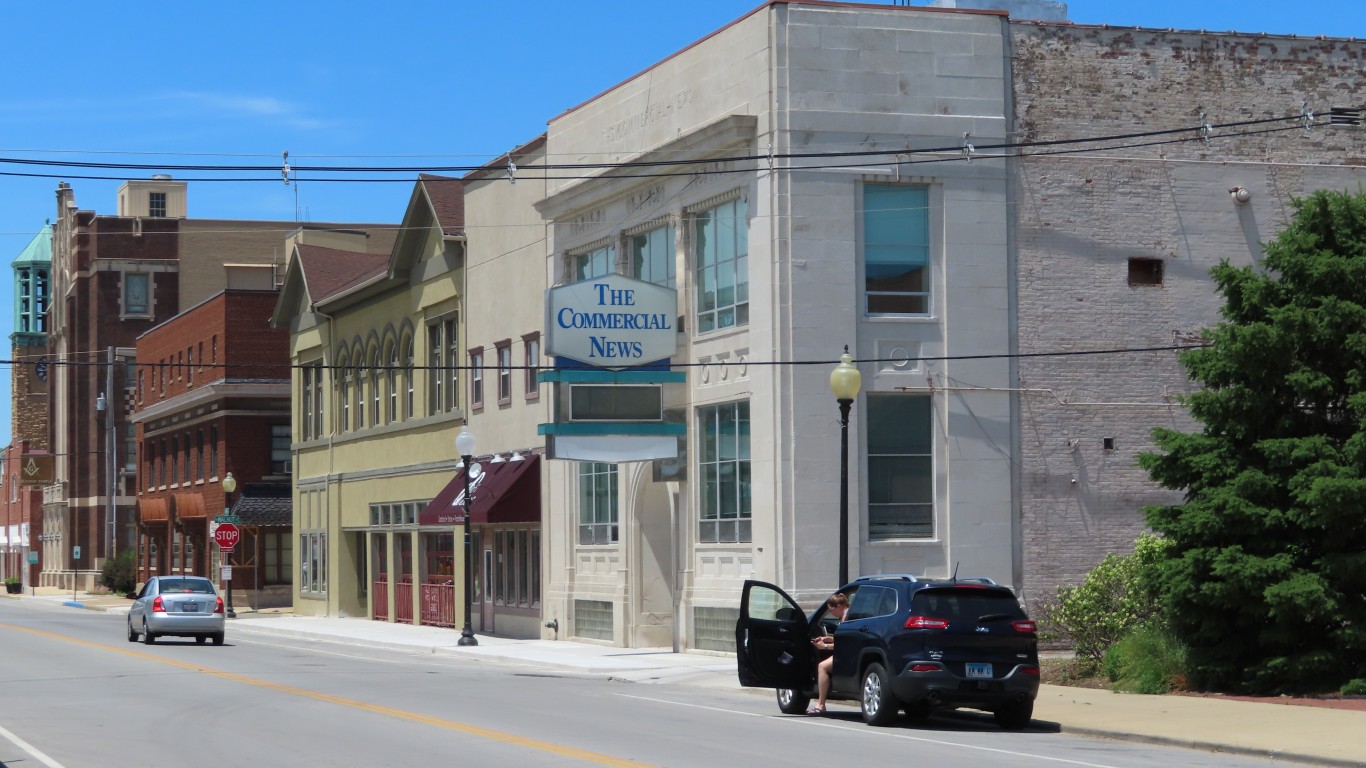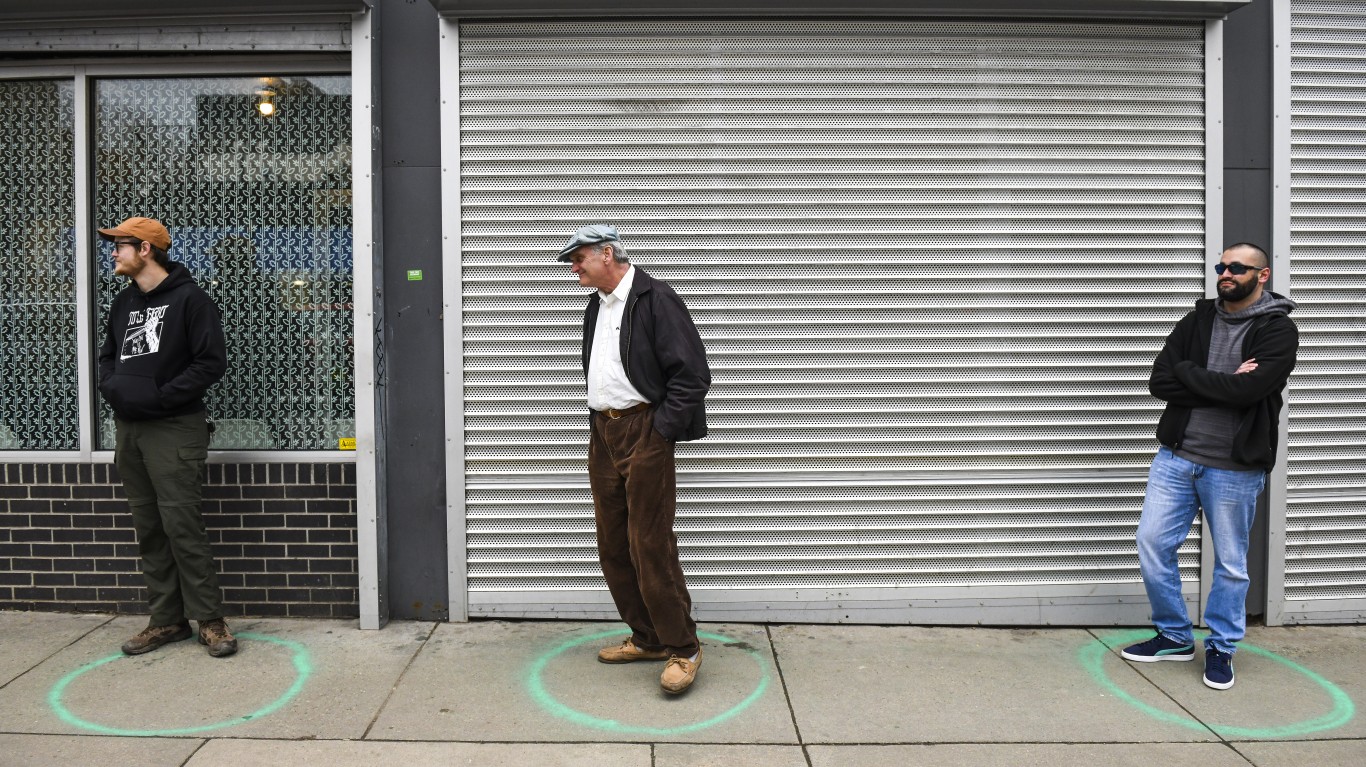
The U.S. has reported more than 79.6 million confirmed COVID-19 cases as of April 12. More than 978,000 Americans have died of COVID-19 — the highest death toll of any country.
The virus has spread throughout the country in a way that has been difficult to predict, surging in one region, then showing signs of improvement, and then reappearing in other regions. Though local outbreaks may ebb and flow, the current surge in cases has been felt nearly nationwide, leading to new travel restrictions and business closures around the country.
Nationwide, there were an average of 8.9 daily new coronavirus cases per 100,000 Americans in the week ending April 12. Cumulatively, the U.S. has reported 24,265.0 cases per 100,000 Americans, and 298.0 deaths per 100,000 Americans.
The coronavirus has spread to different parts of the country in different stages throughout the pandemic. In the spring, the worst hit states were in the Northeast, as New York City became the epicenter of the nation’s crisis. The virus spread to states throughout the Sun Belt in the summer, and hit states in the Midwest and West during the fall. Now, nearly every state is categorized as a COVID-19 hotspot, according to definitions based on new cases per capita from the nonprofit health organization Kaiser Family Foundation.
While the nation’s largest metropolitan areas were hit hardest in the early months of the pandemic, nearly every city has suffered from the virus. Outbreaks are particularly likely to occur in places where large numbers of people tend to congregate, leaving cities with high concentrations of colleges, correctional facilities, and nursing homes particularly at risk.
To determine the metropolitan area in each state with the highest number of COVID-19 cases per capita, 24/7 Wall St. compiled and reviewed data from state and local health departments. We ranked metropolitan areas according to the number of confirmed COVID-19 cases per 100,000 residents as of April 12. Data was aggregated from the county level to the metropolitan area level using boundary definitions from the U.S. Census Bureau. Population data used to adjust case and death totals came from the U.S. Census Bureau’s 2019 American Community Survey and are five-year estimates.
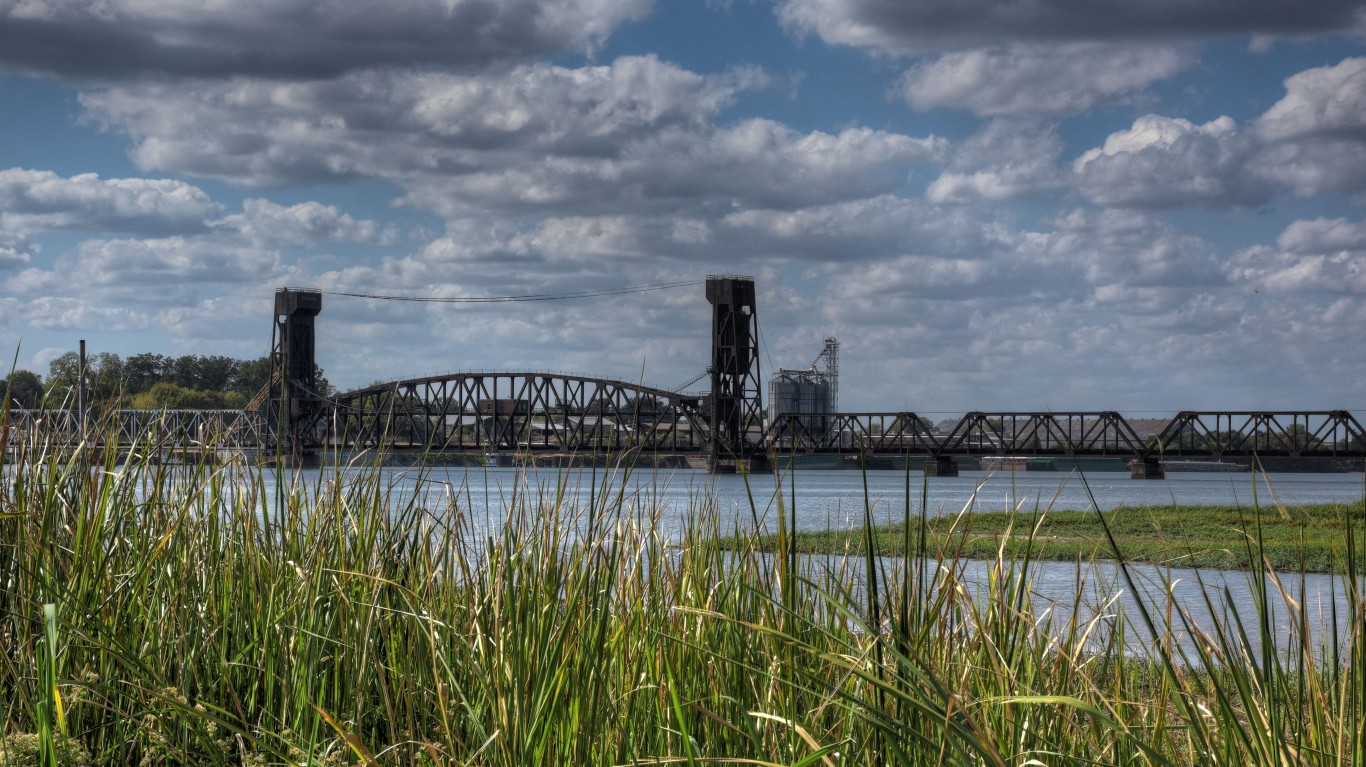
Alabama: Decatur
COVID-19 cases as of April 12 in Decatur: 43,657 (28,670.6 per 100,000)
COVID-19 cases as of April 12 in Alabama: 1,297,097 (26,454.2 per 100,000)
Peak pandemic unemployment in Decatur: 12.0% (April 2020)
Decatur population: 152,271 (119.9 per sq. mi.)
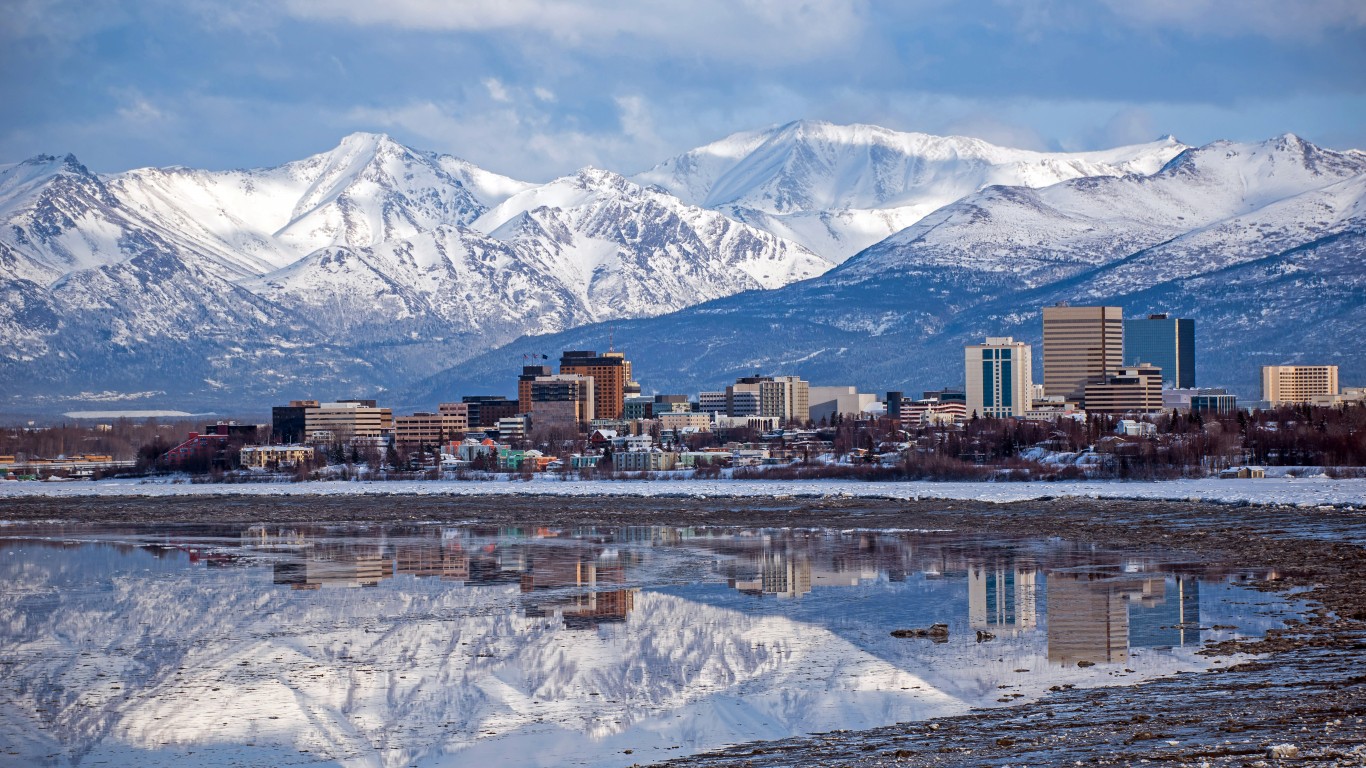
Alaska: Anchorage
COVID-19 cases as of April 12 in Anchorage: 137,625 (34,501.1 per 100,000)
COVID-19 cases as of April 12 in Alaska: 240,674 (32,899.4 per 100,000)
Peak pandemic unemployment in Anchorage: 14.8% (April 2020)
Anchorage population: 398,900 (15.2 per sq. mi.)
These are all the counties in Alaska where COVID-19 is slowing (and where it’s still getting worse).

Arizona: Flagstaff
COVID-19 cases as of April 12 in Flagstaff: 43,529 (30,811.8 per 100,000)
COVID-19 cases as of April 12 in Arizona: 2,014,020 (27,670.0 per 100,000)
Peak pandemic unemployment in Flagstaff: 17.9% (April 2020)
Flagstaff population: 141,274 (7.6 per sq. mi.)

Arkansas: Jonesboro
COVID-19 cases as of April 12 in Jonesboro: 45,613 (34,755.1 per 100,000)
COVID-19 cases as of April 12 in Arkansas: 833,685 (27,625.6 per 100,000)
Peak pandemic unemployment in Jonesboro: 9.3% (April 2020)
Jonesboro population: 131,241 (89.5 per sq. mi.)
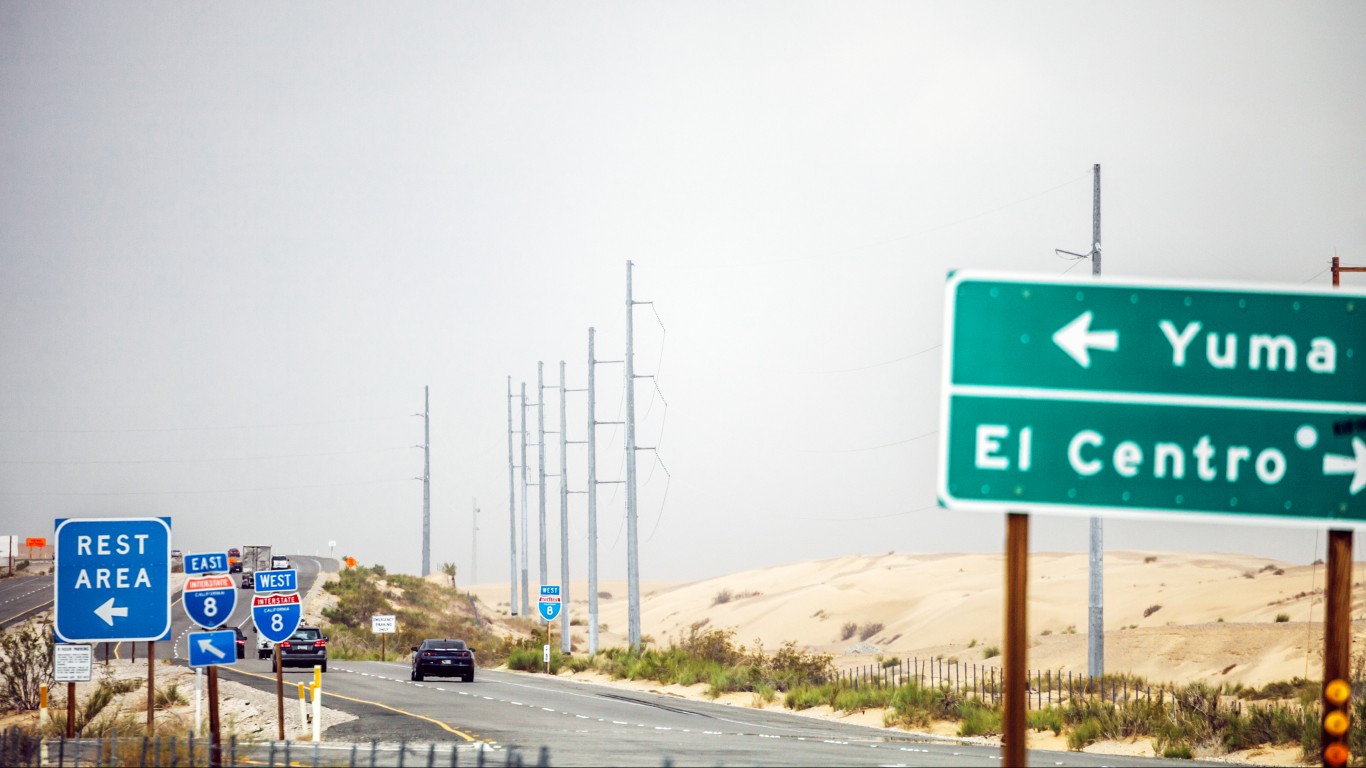
California: El Centro
COVID-19 cases as of April 12 in El Centro: 66,395 (36,743.0 per 100,000)
COVID-19 cases as of April 12 in California: 9,115,022 (23,068.9 per 100,000)
Peak pandemic unemployment in El Centro: 30.0% (April 2020)
El Centro population: 180,701 (43.3 per sq. mi.)

Colorado: Grand Junction
COVID-19 cases as of April 12 in Grand Junction: 42,295 (27,969.6 per 100,000)
COVID-19 cases as of April 12 in Colorado: 1,355,882 (23,544.8 per 100,000)
Peak pandemic unemployment in Grand Junction: 12.5% (April 2020)
Grand Junction population: 151,218 (45.4 per sq. mi.)
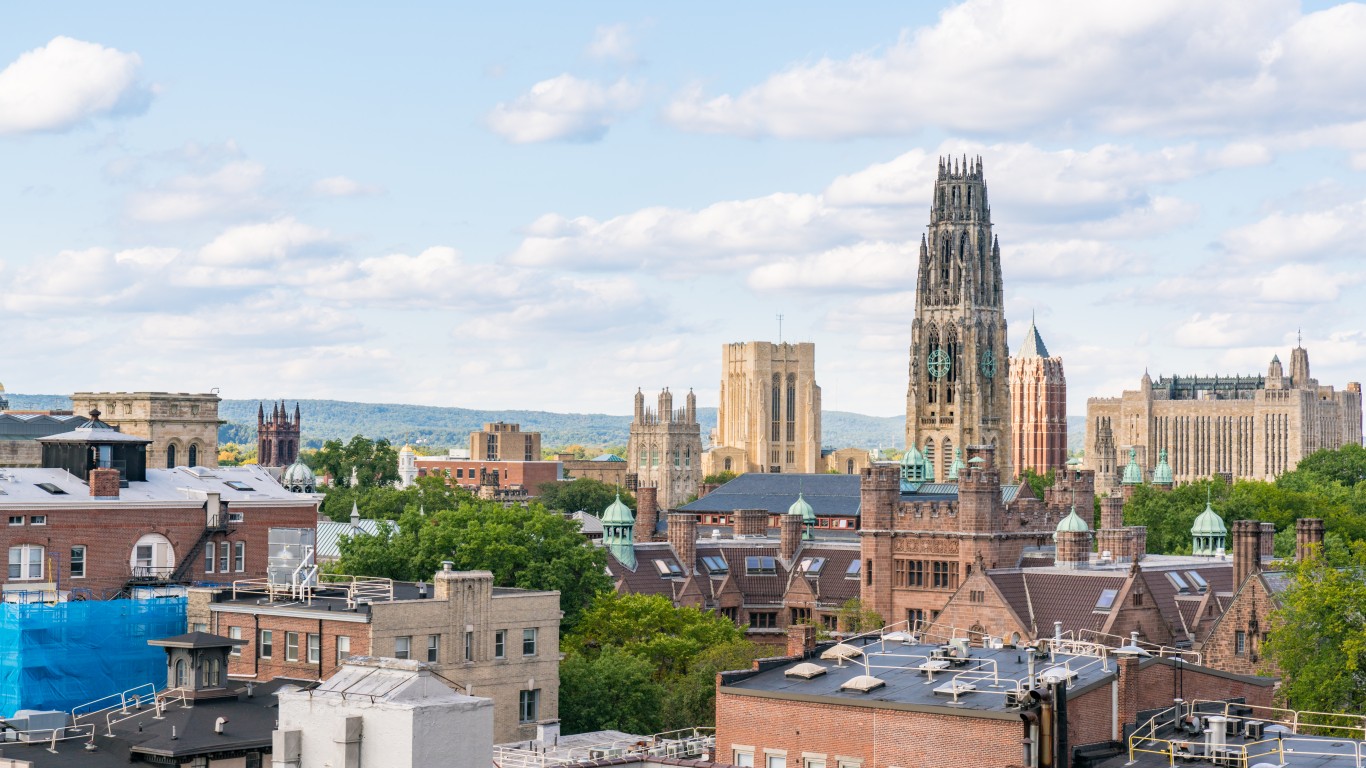
Connecticut: New Haven-Milford
COVID-19 cases as of April 12 in New Haven: 195,898 (22,844.9 per 100,000)
COVID-19 cases as of April 12 in Connecticut: 740,894 (20,780.8 per 100,000)
Peak pandemic unemployment in New Haven: 9.5% (July 2020)
New Haven population: 857,513 (1,418.5 per sq. mi.)

Delaware: Dover
COVID-19 cases as of April 12 in Dover: 50,229 (28,426.3 per 100,000)
COVID-19 cases as of April 12 in Delaware: 260,291 (26,730.4 per 100,000)
Peak pandemic unemployment in Dover: 17.3% (May 2020)
Dover population: 176,699 (301.4 per sq. mi.)

Florida: Miami-Fort Lauderdale-Pompano Beach
COVID-19 cases as of April 12 in Miami: 2,164,355 (35,535.6 per 100,000)
COVID-19 cases as of April 12 in Florida: 5,867,926 (27,321.0 per 100,000)
Peak pandemic unemployment in Miami: 13.8% (April 2020)
Miami population: 6,090,660 (1,199.6 per sq. mi.)

Georgia: Dalton
COVID-19 cases as of April 12 in Dalton: 45,480 (31,591.9 per 100,000)
COVID-19 cases as of April 12 in Georgia: 2,503,082 (23,575.2 per 100,000)
Peak pandemic unemployment in Dalton: 20.3% (April 2020)
Dalton population: 143,961 (226.7 per sq. mi.)

Hawaii: Kahului-Wailuku-Lahaina
COVID-19 cases as of April 12 in Kahului: 30,047 (18,102.9 per 100,000)
COVID-19 cases as of April 12 in Hawaii: 235,797 (16,653.8 per 100,000)
Peak pandemic unemployment in Kahului: 34.8% (April 2020)
Kahului population: 165,979 (142.9 per sq. mi.)
These are all the counties in Hawaii where COVID-19 is slowing (and where it’s still getting worse).

Idaho: Boise City
COVID-19 cases as of April 12 in Boise City: 202,167 (28,444.5 per 100,000)
COVID-19 cases as of April 12 in Idaho: 444,637 (24,880.9 per 100,000)
Peak pandemic unemployment in Boise City: 12.6% (April 2020)
Boise City population: 710,743 (60.4 per sq. mi.)
These are all the counties in Idaho where COVID-19 is slowing (and where it’s still getting worse).
Illinois: Danville
COVID-19 cases as of April 12 in Danville: 27,891 (35,959.2 per 100,000)
COVID-19 cases as of April 12 in Illinois: 3,080,436 (24,309.3 per 100,000)
Peak pandemic unemployment in Danville: 18.4% (April 2020)
Danville population: 77,563 (86.3 per sq. mi.)
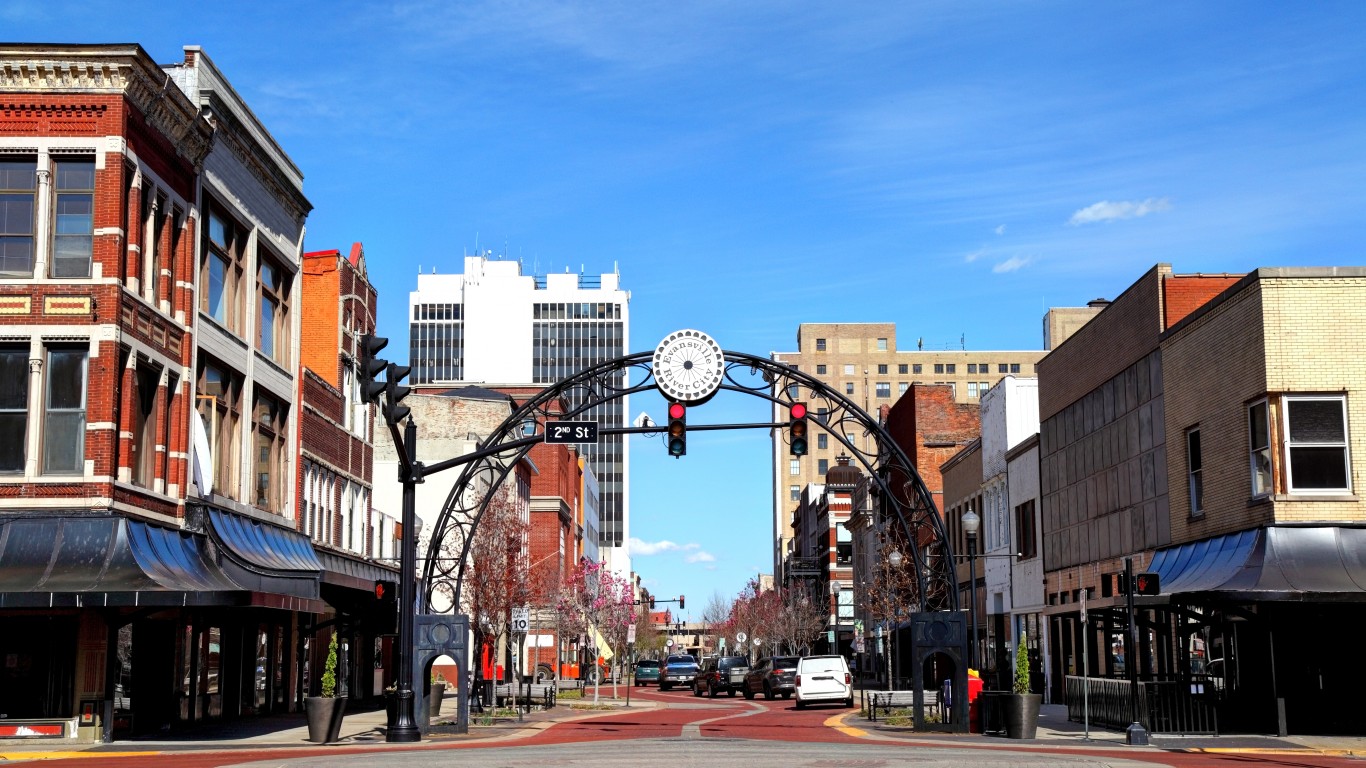
Indiana: Evansville, IN-KY
COVID-19 cases as of April 12 in Evansville: 97,860 (31,070.6 per 100,000)
COVID-19 cases as of April 12 in Indiana: 1,692,700 (25,143.3 per 100,000)
Peak pandemic unemployment in Evansville: 15.2% (April 2020)
Evansville population: 314,960 (215.1 per sq. mi.)
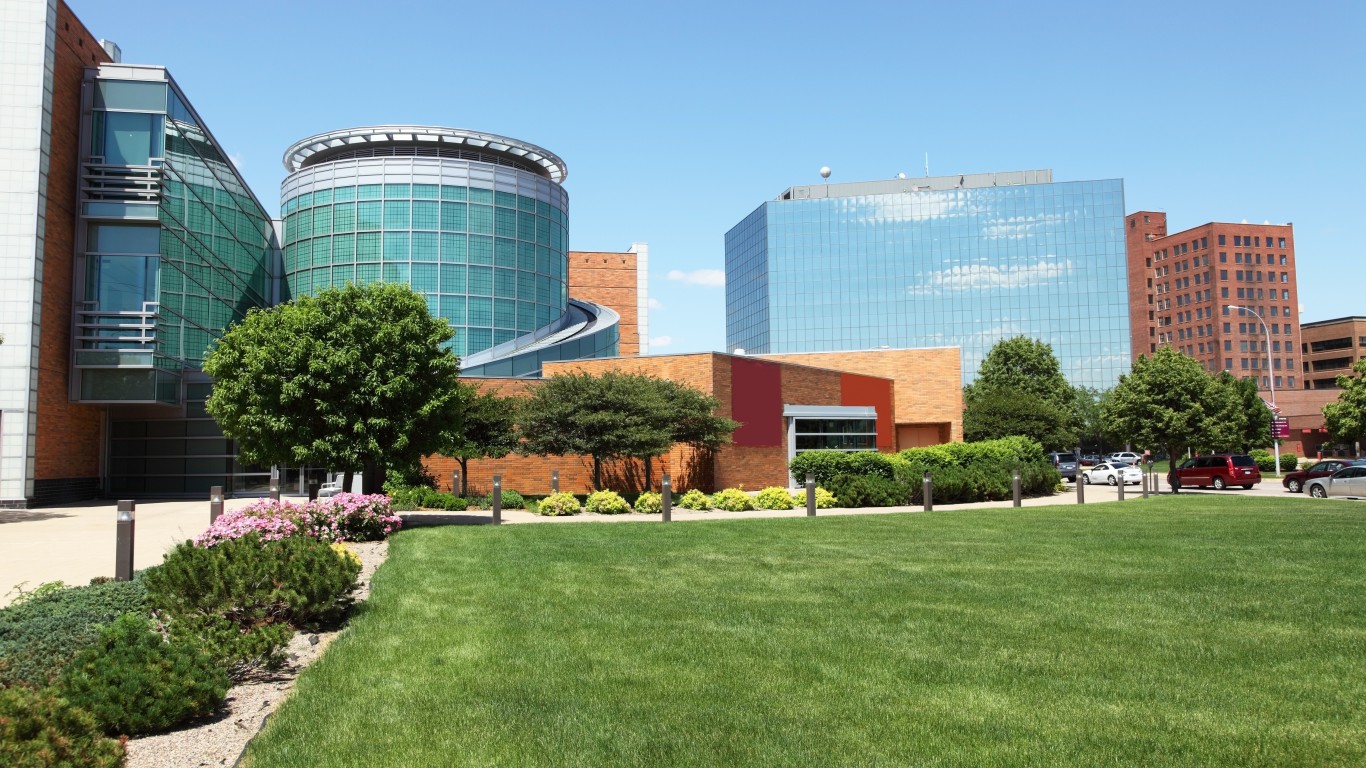
Iowa: Sioux City, IA-NE-SD
COVID-19 cases as of April 12 in Sioux City: 40,873 (28,414.4 per 100,000)
COVID-19 cases as of April 12 in Iowa: 759,721 (24,079.4 per 100,000)
Peak pandemic unemployment in Sioux City: 9.8% (April 2020)
Sioux City population: 143,846 (69.4 per sq. mi.)
These are all the counties in Iowa where COVID-19 is slowing (and where it’s still getting worse).

Kansas: Wichita
COVID-19 cases as of April 12 in Wichita: 178,812 (28,040.6 per 100,000)
COVID-19 cases as of April 12 in Kansas: 770,977 (26,463.9 per 100,000)
Peak pandemic unemployment in Wichita: 18.2% (April 2020)
Wichita population: 637,690 (153.7 per sq. mi.)
These are all the counties in Kansas where COVID-19 is slowing (and where it’s still getting worse).
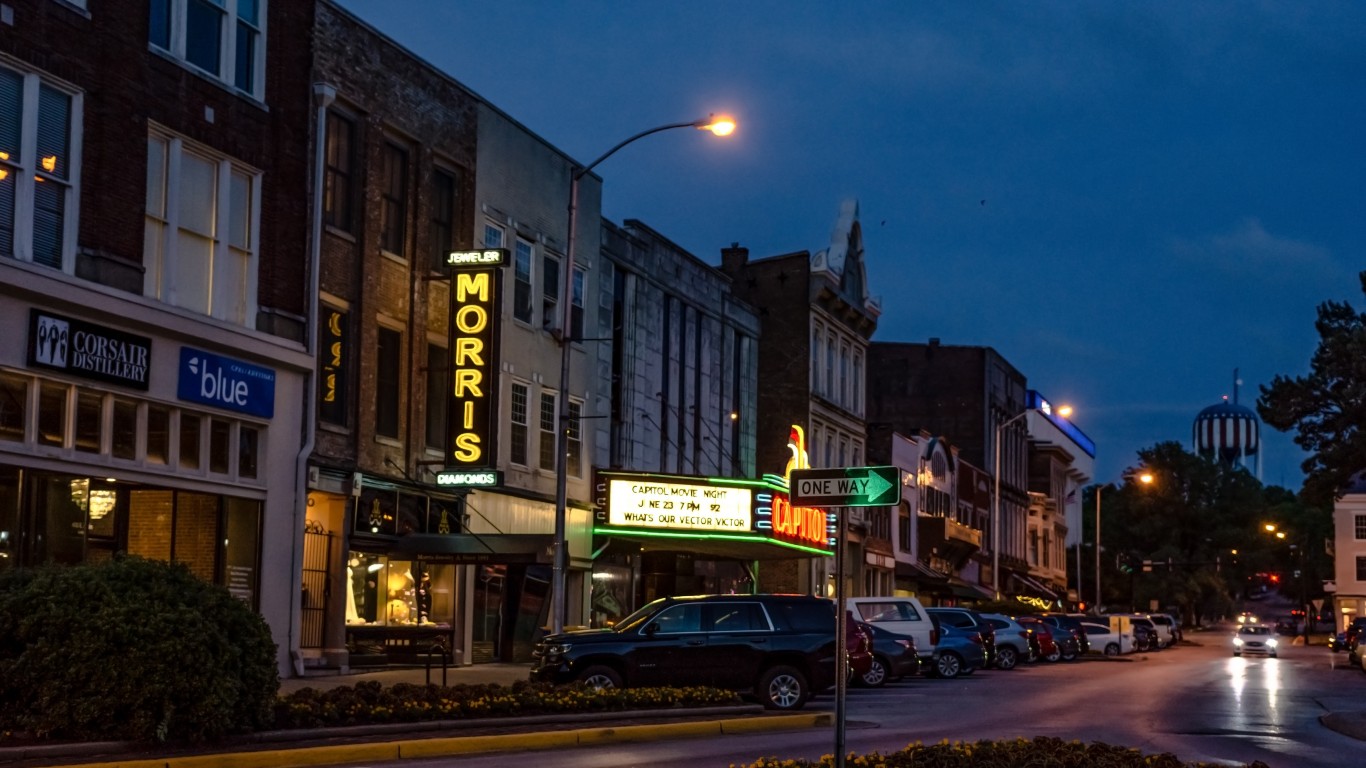
Kentucky: Bowling Green
COVID-19 cases as of April 12 in Bowling Green: 55,853 (32,007.8 per 100,000)
COVID-19 cases as of April 12 in Kentucky: 1,318,950 (29,522.1 per 100,000)
Peak pandemic unemployment in Bowling Green: 18.8% (April 2020)
Bowling Green population: 174,498 (108.1 per sq. mi.)
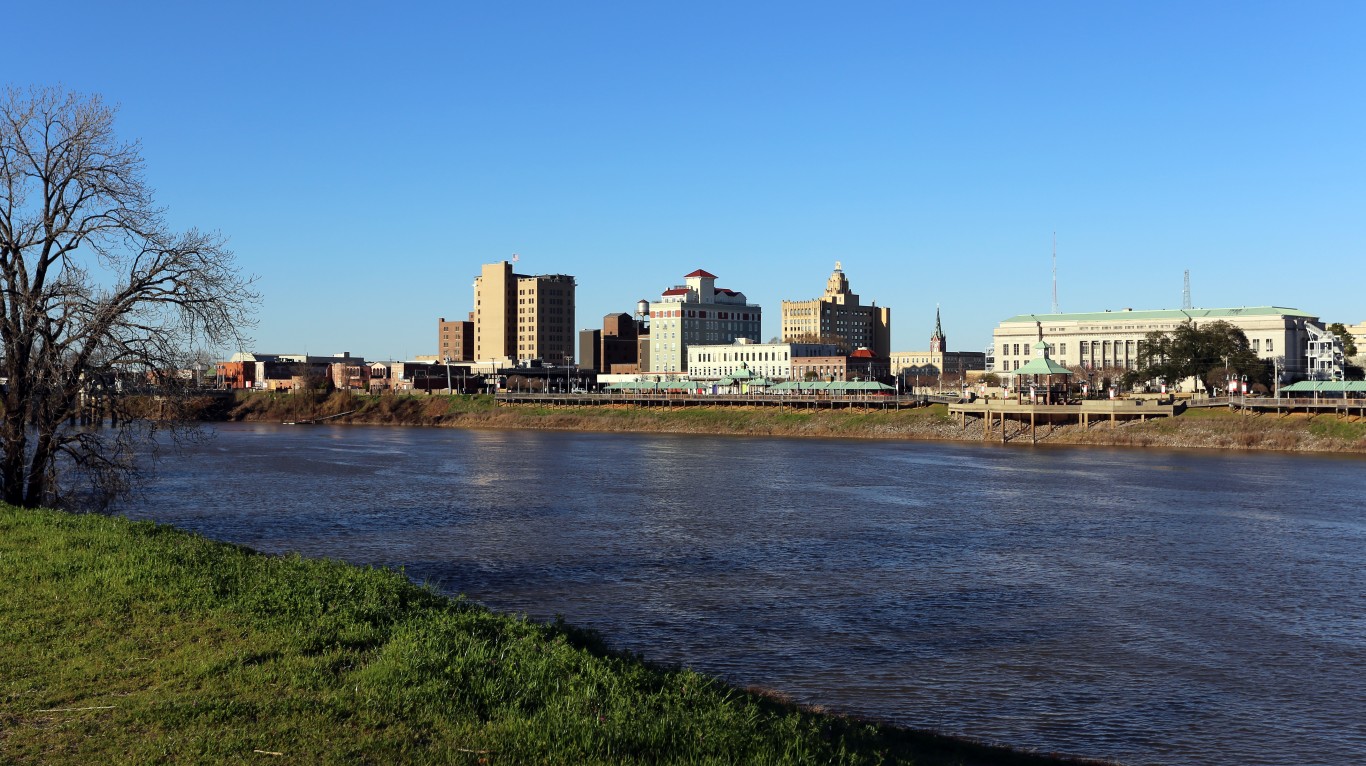
Louisiana: Monroe
COVID-19 cases as of April 12 in Monroe: 60,226 (29,601.3 per 100,000)
COVID-19 cases as of April 12 in Louisiana: 1,169,338 (25,153.6 per 100,000)
Peak pandemic unemployment in Monroe: 12.8% (April 2020)
Monroe population: 203,457 (89.1 per sq. mi.)

Maine: Lewiston-Auburn
COVID-19 cases as of April 12 in Lewiston: 22,476 (20,888.1 per 100,000)
COVID-19 cases as of April 12 in Maine: 237,717 (17,684.5 per 100,000)
Peak pandemic unemployment in Lewiston: 10.3% (July 2020)
Lewiston population: 107,602 (230.0 per sq. mi.)
These are all the counties in Maine where COVID-19 is slowing (and where it’s still getting worse).
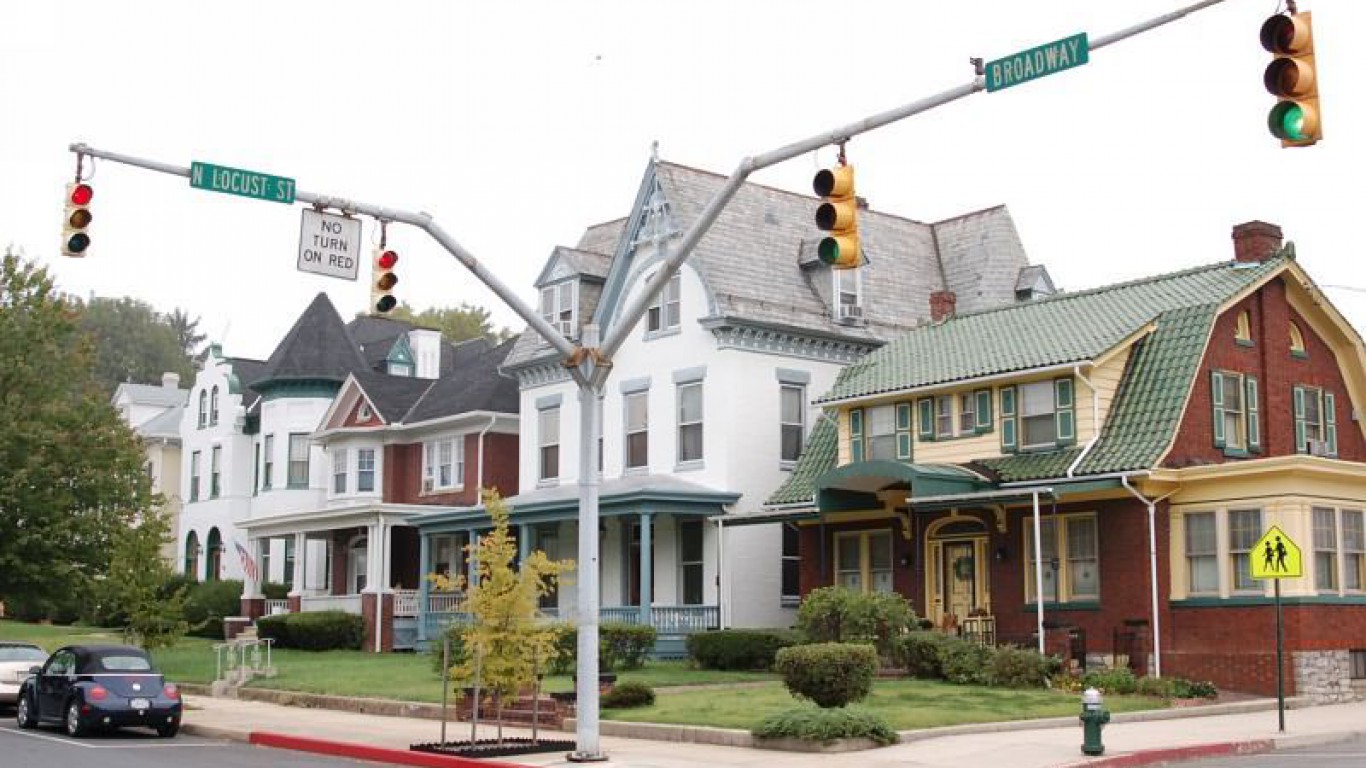
Maryland: Hagerstown-Martinsburg, MD-WV
COVID-19 cases as of April 12 in Hagerstown: 75,007 (26,490.5 per 100,000)
COVID-19 cases as of April 12 in Maryland: 1,016,029 (16,805.9 per 100,000)
Peak pandemic unemployment in Hagerstown: 12.0% (April 2020)
Hagerstown population: 283,147 (280.9 per sq. mi.)

Massachusetts: Springfield
COVID-19 cases as of April 12 in Springfield: 171,603 (24,532.9 per 100,000)
COVID-19 cases as of April 12 in Massachusetts: 1,709,900 (24,808.1 per 100,000)
Peak pandemic unemployment in Springfield: 17.1% (June 2020)
Springfield population: 699,480 (379.4 per sq. mi.)

Michigan: Bay City
COVID-19 cases as of April 12 in Bay City: 26,993 (25,928.9 per 100,000)
COVID-19 cases as of April 12 in Michigan: 2,393,265 (23,964.1 per 100,000)
Peak pandemic unemployment in Bay City: 25.6% (April 2020)
Bay City population: 104,104 (235.4 per sq. mi.)
Minnesota: St. Cloud
COVID-19 cases as of April 12 in St. Cloud: 64,749 (32,605.8 per 100,000)
COVID-19 cases as of April 12 in Minnesota: 1,433,225 (25,413.4 per 100,000)
Peak pandemic unemployment in St. Cloud: 9.4% (May 2020)
St. Cloud population: 198,581 (113.4 per sq. mi.)
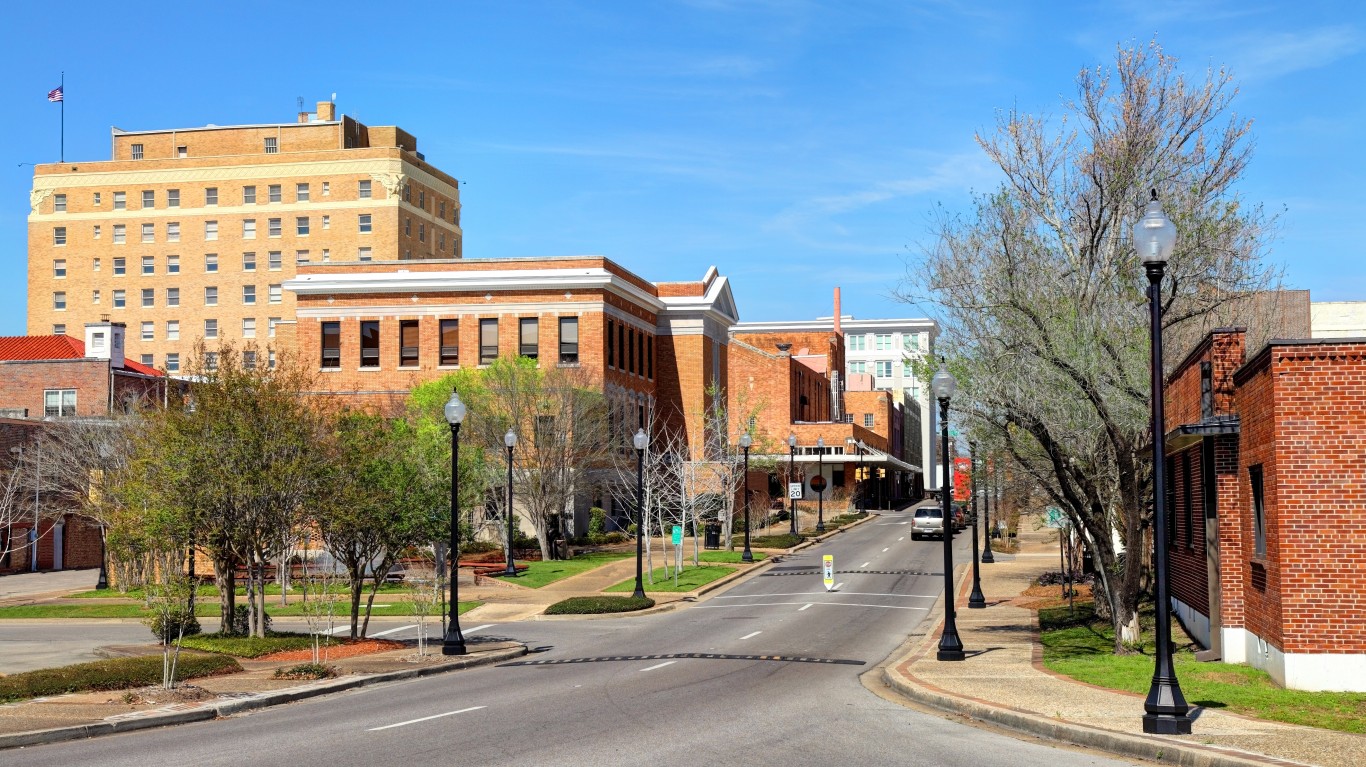
Mississippi: Hattiesburg
COVID-19 cases as of April 12 in Hattiesburg: 49,426 (29,389.3 per 100,000)
COVID-19 cases as of April 12 in Mississippi: 795,824 (26,740.1 per 100,000)
Peak pandemic unemployment in Hattiesburg: 13.3% (April 2020)
Hattiesburg population: 168,177 (83.1 per sq. mi.)
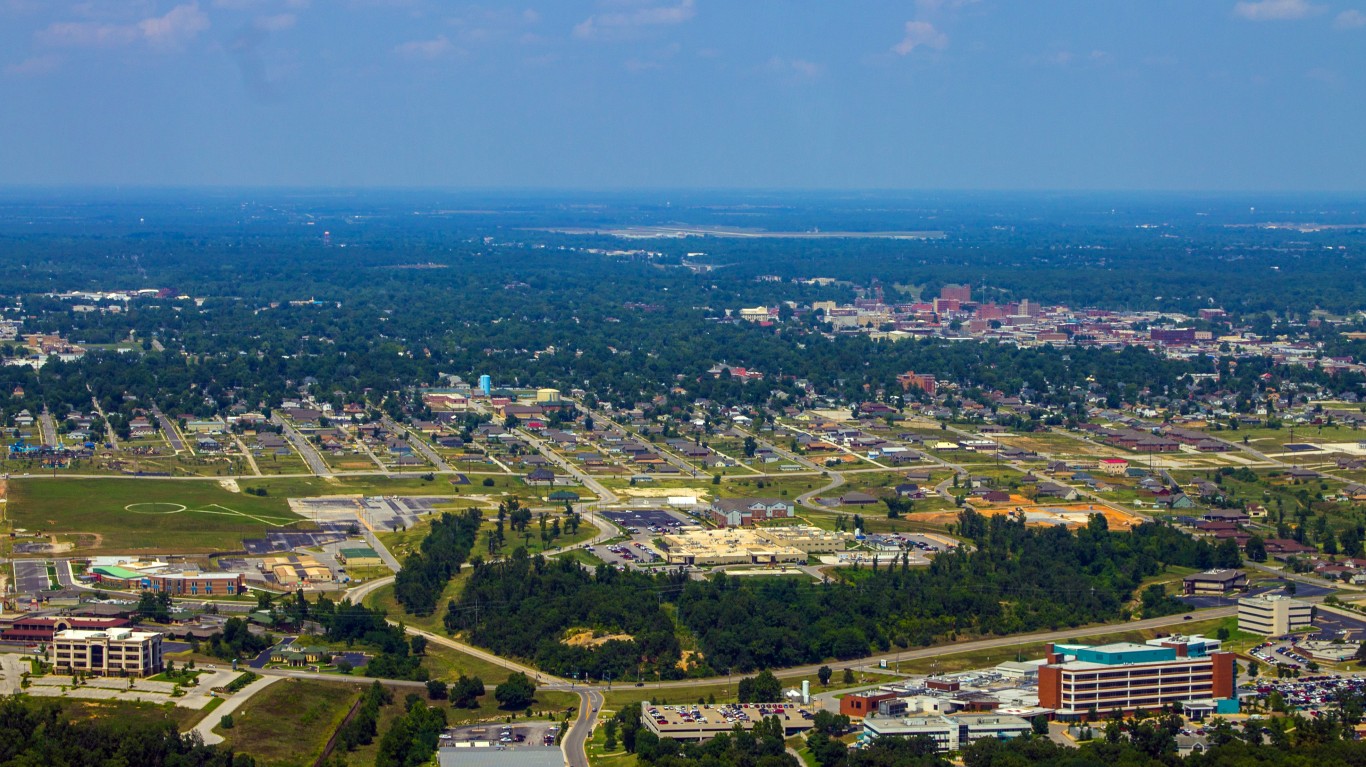
Missouri: Joplin
COVID-19 cases as of April 12 in Joplin: 46,327 (26,011.8 per 100,000)
COVID-19 cases as of April 12 in Missouri: 1,415,467 (23,062.9 per 100,000)
Peak pandemic unemployment in Joplin: 10.6% (April 2020)
Joplin population: 178,100 (141.0 per sq. mi.)
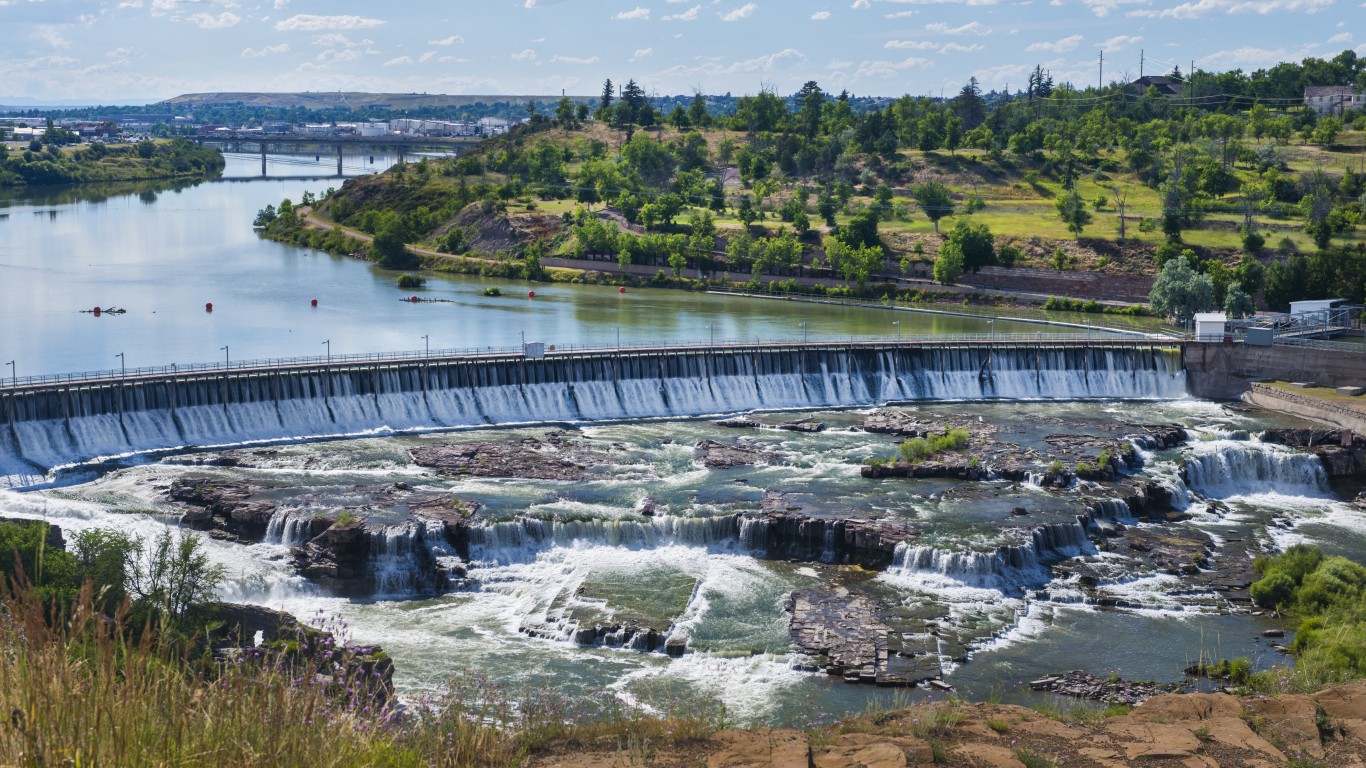
Montana: Great Falls
COVID-19 cases as of April 12 in Great Falls: 25,128 (30,784.7 per 100,000)
COVID-19 cases as of April 12 in Montana: 272,849 (25,529.1 per 100,000)
Peak pandemic unemployment in Great Falls: 12.6% (April 2020)
Great Falls population: 81,625 (30.3 per sq. mi.)

Nebraska: Omaha-Council Bluffs, NE-IA
COVID-19 cases as of April 12 in Omaha: 246,190 (26,421.5 per 100,000)
COVID-19 cases as of April 12 in Nebraska: 478,044 (24,712.7 per 100,000)
Peak pandemic unemployment in Omaha: 10.2% (April 2020)
Omaha population: 931,779 (214.2 per sq. mi.)

Nevada: Carson City
COVID-19 cases as of April 12 in Carson City: 14,886 (27,177.6 per 100,000)
COVID-19 cases as of April 12 in Nevada: 714,652 (23,201.8 per 100,000)
Peak pandemic unemployment in Carson City: 21.0% (April 2020)
Carson City population: 54,773 (378.6 per sq. mi.)
These are all the counties in Nevada where COVID-19 is slowing (and where it’s still getting worse).

New Hampshire: Manchester-Nashua
COVID-19 cases as of April 12 in Manchester: 97,391 (23,579.4 per 100,000)
COVID-19 cases as of April 12 in New Hampshire: 303,755 (22,339.7 per 100,000)
Peak pandemic unemployment in Manchester: 17.5% (April 2020)
Manchester population: 413,035 (471.4 per sq. mi.)
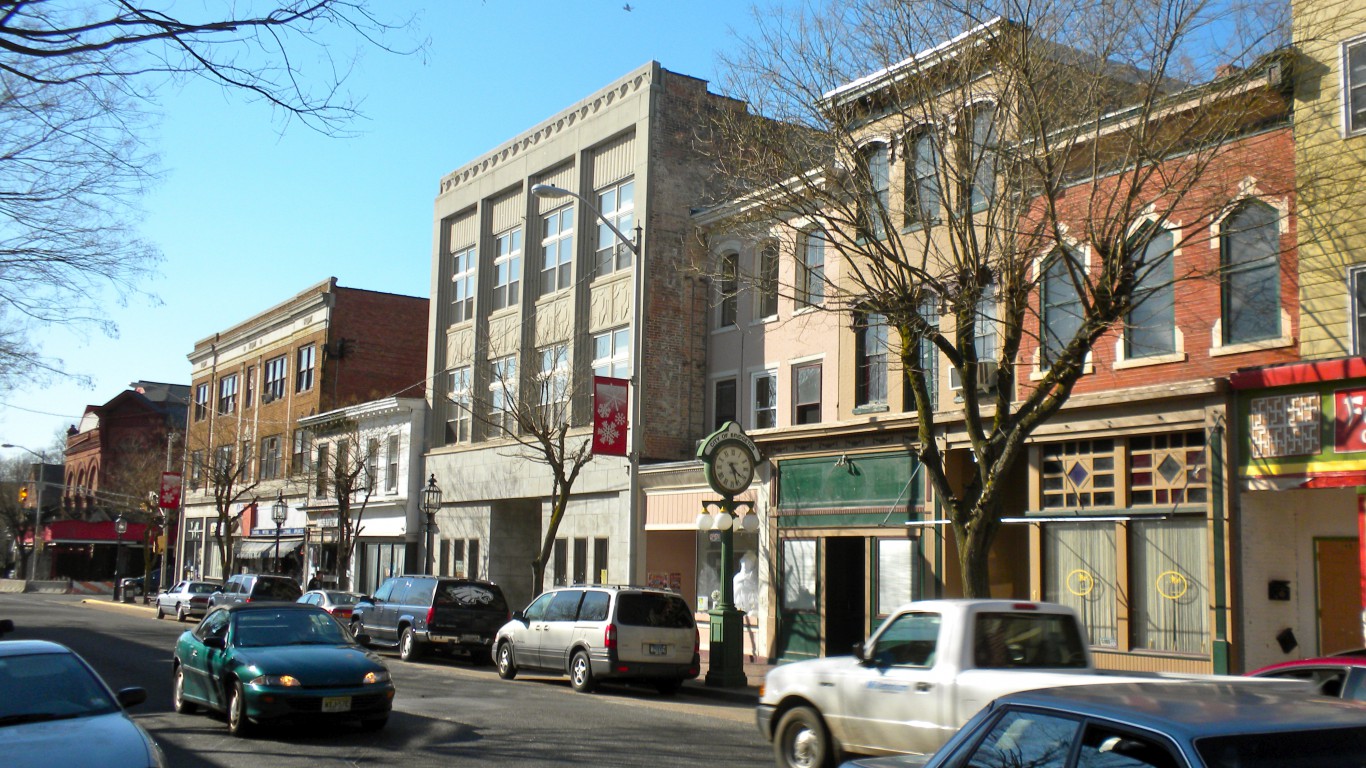
New Jersey: Vineland-Bridgeton
COVID-19 cases as of April 12 in Vineland: 39,483 (25,991.7 per 100,000)
COVID-19 cases as of April 12 in New Jersey: 2,215,685 (24,945.3 per 100,000)
Peak pandemic unemployment in Vineland: 17.5% (June 2020)
Vineland population: 151,906 (314.1 per sq. mi.)
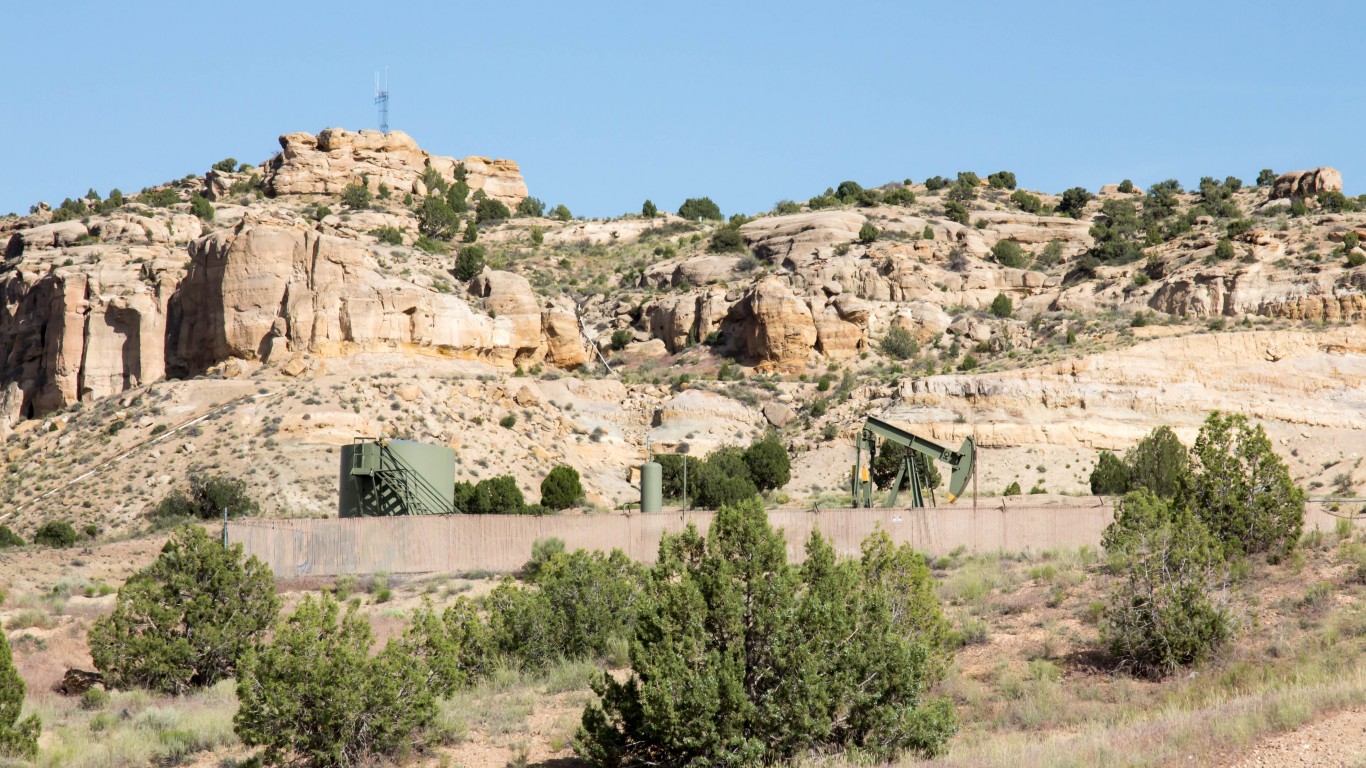
New Mexico: Farmington
COVID-19 cases as of April 12 in Farmington: 40,717 (32,183.5 per 100,000)
COVID-19 cases as of April 12 in New Mexico: 518,941 (24,748.8 per 100,000)
Peak pandemic unemployment in Farmington: 14.5% (July 2020)
Farmington population: 126,515 (22.9 per sq. mi.)

New York: New York-Newark-Jersey City, NY-NJ-PA
COVID-19 cases as of April 12 in New York: 5,219,555 (27,052.4 per 100,000)
COVID-19 cases as of April 12 in New York: 5,025,786 (25,834.8 per 100,000)
Peak pandemic unemployment in New York: 17.2% (June 2020)
New York population: 19,294,236 (2,885.4 per sq. mi.)

North Carolina: Greenville
COVID-19 cases as of April 12 in Greenville: 52,313 (29,318.0 per 100,000)
COVID-19 cases as of April 12 in North Carolina: 2,634,007 (25,114.3 per 100,000)
Peak pandemic unemployment in Greenville: 10.5% (April 2020)
Greenville population: 178,433 (273.7 per sq. mi.)
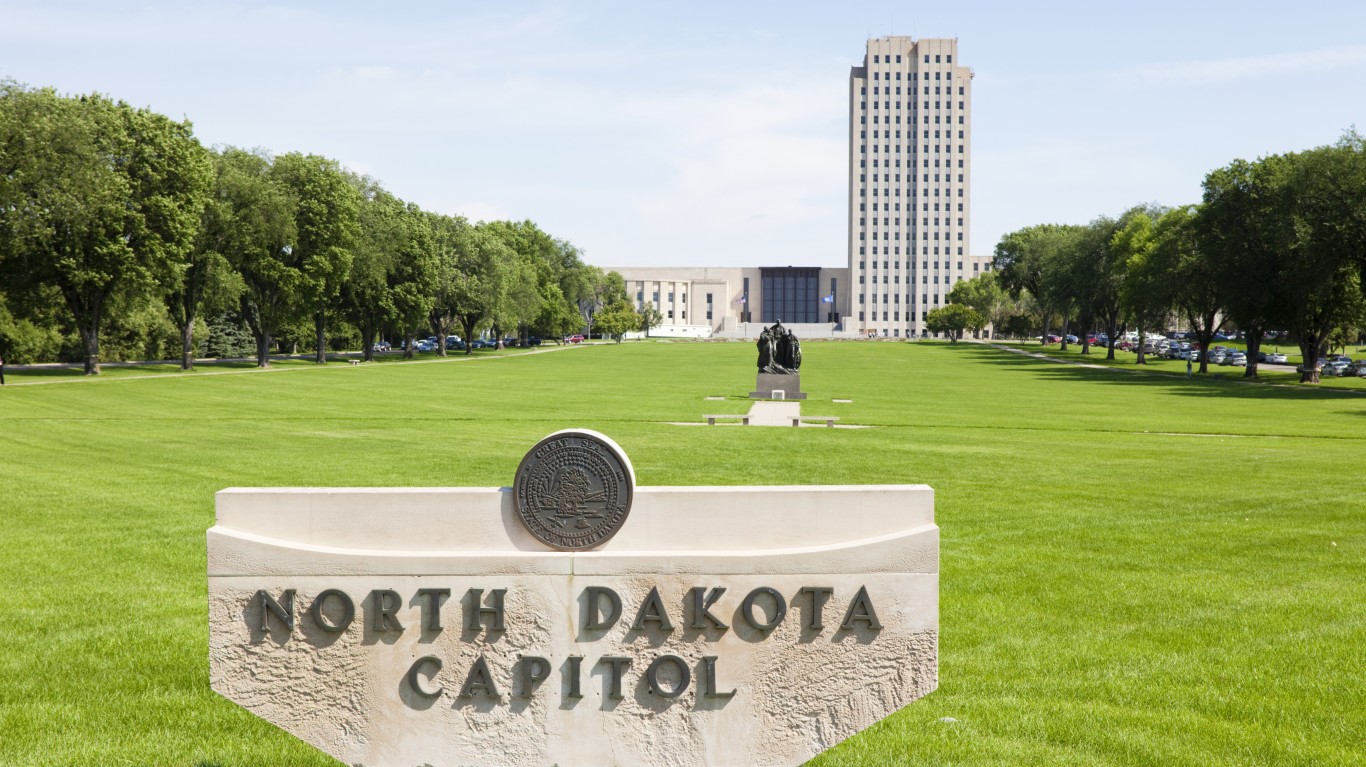
North Dakota: Bismarck
COVID-19 cases as of April 12 in Bismarck: 46,459 (36,437.6 per 100,000)
COVID-19 cases as of April 12 in North Dakota: 240,109 (31,507.8 per 100,000)
Peak pandemic unemployment in Bismarck: 9.5% (April 2020)
Bismarck population: 127,503 (29.8 per sq. mi.)

Ohio: Lima
COVID-19 cases as of April 12 in Lima: 27,433 (26,588.8 per 100,000)
COVID-19 cases as of April 12 in Ohio: 2,676,629 (22,898.5 per 100,000)
Peak pandemic unemployment in Lima: 20.4% (April 2020)
Lima population: 103,175 (256.3 per sq. mi.)
These are all the counties in Ohio where COVID-19 is slowing (and where it’s still getting worse).

Oklahoma: Lawton
COVID-19 cases as of April 12 in Lawton: 34,441 (26,987.1 per 100,000)
COVID-19 cases as of April 12 in Oklahoma: 1,036,133 (26,185.0 per 100,000)
Peak pandemic unemployment in Lawton: 19.5% (April 2020)
Lawton population: 127,620 (75.0 per sq. mi.)

Oregon: Bend
COVID-19 cases as of April 12 in Bend: 45,997 (24,696.2 per 100,000)
COVID-19 cases as of April 12 in Oregon: 706,687 (16,755.1 per 100,000)
Peak pandemic unemployment in Bend: 18.3% (April 2020)
Bend population: 186,251 (61.7 per sq. mi.)
These are all the counties in Oregon where COVID-19 is slowing (and where it’s still getting worse).

Pennsylvania: York-Hanover
COVID-19 cases as of April 12 in York: 118,613 (26,620.8 per 100,000)
COVID-19 cases as of April 12 in Pennsylvania: 2,789,262 (21,787.7 per 100,000)
Peak pandemic unemployment in York: 15.3% (April 2020)
York population: 445,565 (492.8 per sq. mi.)

Rhode Island: Providence-Warwick, RI-MA
COVID-19 cases as of April 12 in Providence: 485,452 (29,998.2 per 100,000)
COVID-19 cases as of April 12 in Rhode Island: 345,431 (32,607.5 per 100,000)
Peak pandemic unemployment in Providence: 18.5% (April 2020)
Providence population: 1,618,268 (1,019.8 per sq. mi.)

South Carolina: Greenville-Anderson
COVID-19 cases as of April 12 in Greenville: 294,327 (32,851.1 per 100,000)
COVID-19 cases as of April 12 in South Carolina: 1,469,706 (28,545.1 per 100,000)
Peak pandemic unemployment in Greenville: 12.5% (April 2020)
Greenville population: 895,942 (330.5 per sq. mi.)

South Dakota: Sioux Falls
COVID-19 cases as of April 12 in Sioux Falls: 75,822 (29,235.6 per 100,000)
COVID-19 cases as of April 12 in South Dakota: 237,246 (26,817.8 per 100,000)
Peak pandemic unemployment in Sioux Falls: 10.7% (April 2020)
Sioux Falls population: 259,348 (100.7 per sq. mi.)

Tennessee: Jackson
COVID-19 cases as of April 12 in Jackson: 58,305 (32,674.5 per 100,000)
COVID-19 cases as of April 12 in Tennessee: 2,022,647 (29,617.7 per 100,000)
Peak pandemic unemployment in Jackson: 14.0% (April 2020)
Jackson population: 178,442 (104.3 per sq. mi.)

Texas: San Angelo
COVID-19 cases as of April 12 in San Angelo: 40,927 (34,688.0 per 100,000)
COVID-19 cases as of April 12 in Texas: 6,692,405 (23,080.5 per 100,000)
Peak pandemic unemployment in San Angelo: 11.1% (April 2020)
San Angelo population: 117,986 (77.5 per sq. mi.)
These are all the counties in Texas where COVID-19 is slowing (and where it’s still getting worse).
Utah: Provo-Orem
COVID-19 cases as of April 12 in Provo: 204,471 (33,150.8 per 100,000)
COVID-19 cases as of April 12 in Utah: 928,621 (28,965.5 per 100,000)
Peak pandemic unemployment in Provo: 8.1% (April 2020)
Provo population: 616,791 (114.3 per sq. mi.)
These are all the counties in Utah where COVID-19 is slowing (and where it’s still getting worse).

Vermont: Burlington-South Burlington
COVID-19 cases as of April 12 in Burlington: 42,000 (19,197.0 per 100,000)
COVID-19 cases as of April 12 in Vermont: 109,324 (17,520.2 per 100,000)
Peak pandemic unemployment in Burlington: 14.8% (April 2020)
Burlington population: 218,784 (174.7 per sq. mi.)

Virginia: Staunton
COVID-19 cases as of April 12 in Staunton: 29,927 (24,600.7 per 100,000)
COVID-19 cases as of April 12 in Virginia: 1,677,294 (19,650.8 per 100,000)
Peak pandemic unemployment in Staunton: 9.9% (April 2020)
Staunton population: 121,651 (121.4 per sq. mi.)

Washington: Kennewick-Richland
COVID-19 cases as of April 12 in Kennewick: 84,880 (29,316.8 per 100,000)
COVID-19 cases as of April 12 in Washington: 1,467,059 (19,265.7 per 100,000)
Peak pandemic unemployment in Kennewick: 13.7% (April 2020)
Kennewick population: 289,527 (98.4 per sq. mi.)

West Virginia: Beckley
COVID-19 cases as of April 12 in Beckley: 35,736 (30,073.7 per 100,000)
COVID-19 cases as of April 12 in West Virginia: 498,414 (27,811.0 per 100,000)
Peak pandemic unemployment in Beckley: 18.4% (April 2020)
Beckley population: 118,828 (93.8 per sq. mi.)
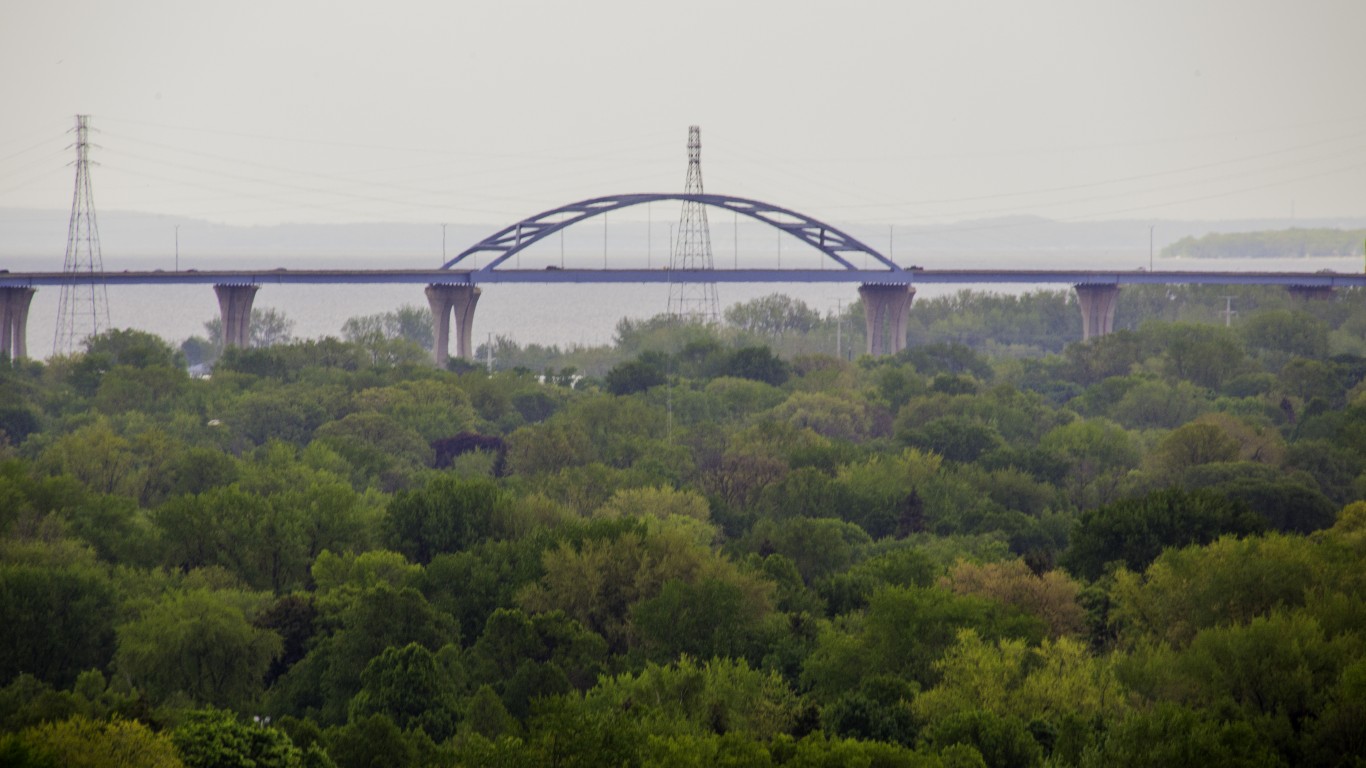
Wisconsin: Green Bay
COVID-19 cases as of April 12 in Green Bay: 101,234 (31,695.0 per 100,000)
COVID-19 cases as of April 12 in Wisconsin: 1,590,205 (27,311.7 per 100,000)
Peak pandemic unemployment in Green Bay: 13.3% (April 2020)
Green Bay population: 319,401 (170.8 per sq. mi.)
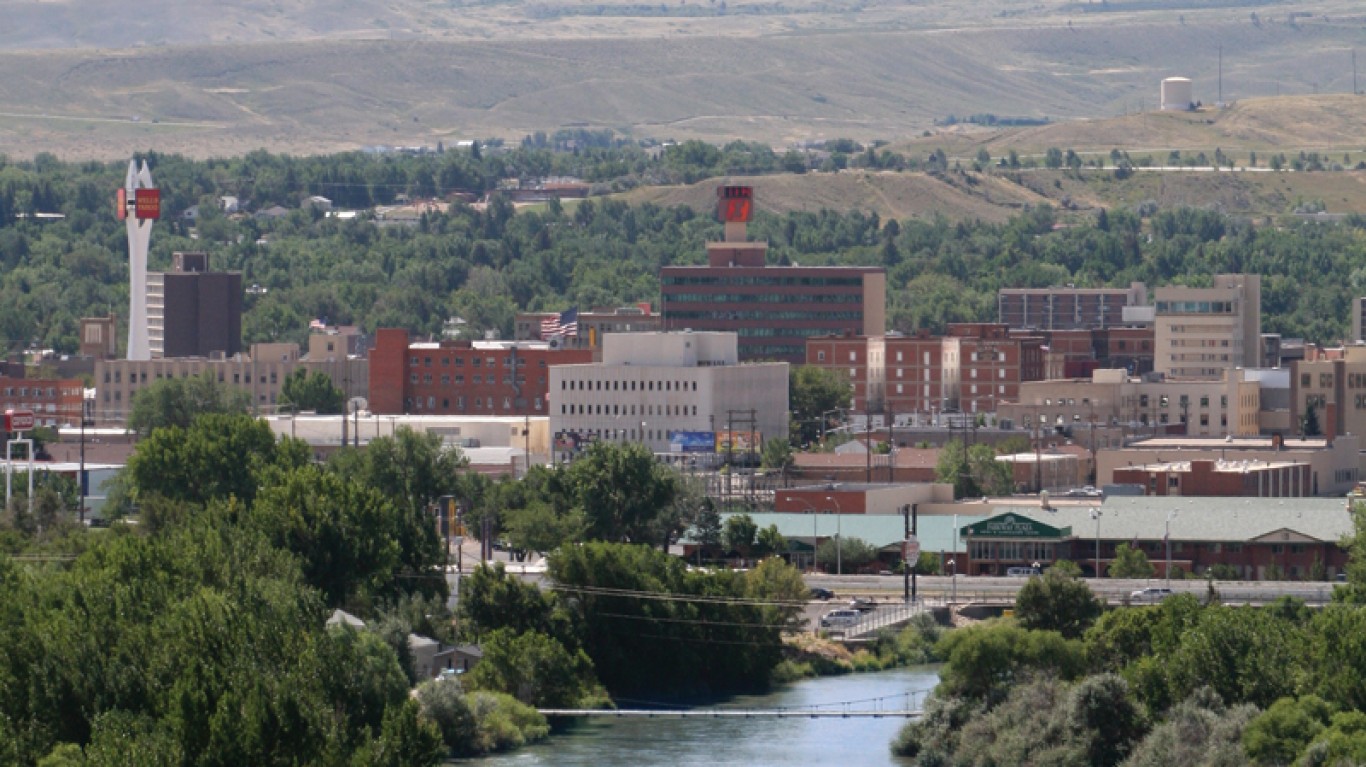
Wyoming: Casper
COVID-19 cases as of April 12 in Casper: 22,273 (27,725.8 per 100,000)
COVID-19 cases as of April 12 in Wyoming: 156,281 (27,002.8 per 100,000)
Peak pandemic unemployment in Casper: 12.6% (April 2020)
Casper population: 80,333 (15.0 per sq. mi.)
Click here to see all coronavirus data for every state.
100 Million Americans Are Missing This Crucial Retirement Tool
The thought of burdening your family with a financial disaster is most Americans’ nightmare. However, recent studies show that over 100 million Americans still don’t have proper life insurance in the event they pass away.
Life insurance can bring peace of mind – ensuring your loved ones are safeguarded against unforeseen expenses and debts. With premiums often lower than expected and a variety of plans tailored to different life stages and health conditions, securing a policy is more accessible than ever.
A quick, no-obligation quote can provide valuable insight into what’s available and what might best suit your family’s needs. Life insurance is a simple step you can take today to help secure peace of mind for your loved ones tomorrow.
Click here to learn how to get a quote in just a few minutes.
Thank you for reading! Have some feedback for us?
Contact the 24/7 Wall St. editorial team.
